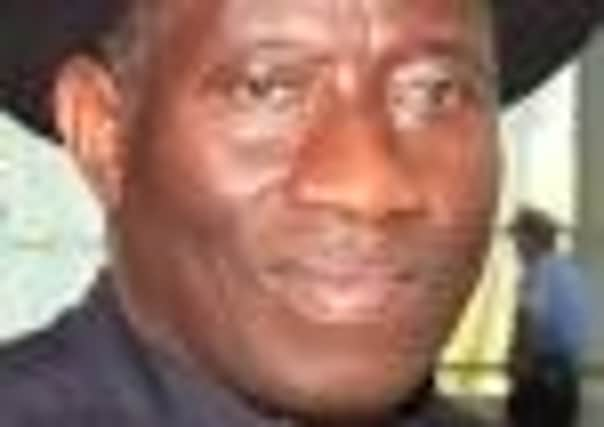Terrorist onslaught kills 67 in Nigeria


A radical Muslim sect known as Boko Haram claimed responsibility for the attacks, which represent the most wide-ranging assault yet in its increasingly bloody sectarian fight with Nigeria’s weak central government, led by president Goodluck Jonathan.
The sect, which wants the strict implementation of sharia law across the nation of more than 160 million people, promised to carry out more attacks.
Advertisement
Hide AdAdvertisement
Hide AdThe fighting centred around Damaturu, the capital of Yobe state, according to the Nigerian Red Cross. The onslaught started on Friday with a car bomb exploding outside a three-storey building used as a military office and barracks in the city, with many uniformed security agents dying in the blast.
Gunmen then went through the town, blowing up a First Bank branch and attacking at least three police stations and some churches, leaving them in rubble.
Gunfire continued through the night and the terrorists raided the village of Potiskum near the capital as well, witnesses said, leaving at least two people dead there.
Early yesterday, people hestitantly emerged from their homes to view the resulting destruction, including military and police vehicles, containing the burned corpses of their drivers still in their seats,
“This place was like a war zone last night. There is no single policeman on the street now, the attacks destroyed mosques and churches. I have seen many injured persons in the hospital,” said local Damaturu shopkeeper Benard Ogbeifun.
“There were dozens of dead bodies, and no vehicles on the road. I’m staying in my shop and praying.”
Another witness, Umar Gambo, said he had seen several dozen dead bodies at the local morgue.
“The streets are deserted. I have lost count of dead bodies, but I saw at least 80 in the mortuary. There is no high presence of security on the streets and two banks were bombed,” he said. “I can’t understand all this madness.”
Advertisement
Hide AdAdvertisement
Hide AdThe attacks around Damaturu came after four separate bombings struck Maiduguri, about 80 miles east. One blast detonated around noon outside the El-Kanemi Theological College where parents had gathered.
Police said others had entered the college grounds to attend Friday prayers at a mosque on its campus.
Witnesses said they saw ambulances carry away at least six wounded people from the site. Another bombing alongside a road in Maiduguri killed four people.
A short time later, suicide bombers driving a black sports utility vehicle attempted to enter a base for the military unit charged with protecting the city from Boko Haram insurgents.
The vehicle couldn’t enter the gate and the explosives were detonated outside of the base, which damaged several buildings in the military’s compound.
Blasts occurred at three other places in Maiduguri besides the base, but, said officials, no-one was killed.
However, government officials routinely downplay such attacks in Nigeria, on political grounds.
Yesterday, a Boko Haram spokesman claimed responsibility for the attacks in an interview with The Daily Trust, the newspaper that serves Nigeria’s Muslim north. A Boko Haram spokesman using the nom de guerre Abul-Qaqa promised that “more attacks are on the way”.
Advertisement
Hide AdAdvertisement
Hide Ad“We will continue attacking federal government formations until security forces stop their excesses on our members and vulnerable civilians.”
His comments come as human rights activists allege soldiers have beaten and killed civilians while trying to hunt down Boko Haram adherents in Maiduguri. Boko Haram’s attacks occurred ahead of Eid al-Adha, or the feast of sacrifice, when Muslims around the world slaughter sheep and cattle in remembrance of Abraham’s near-sacrifice of his son on Mount Arafat.
Police elsewhere in the country had warned of violence ahead of the celebration in Nigeria, a country largely split between a Christian south and a Muslim north. On Wednesday, police in Maiduguri had said they broke up a plot to bomb the city over the holiday.
Boko Haram apparently has split into three factions, increasing the danger for Nigeria. One faction remains moderate and welcomes an end to the violence, another wants a peace agreement with rewards similar to those offered to a different militant group in 2009.
The third faction, though, refuses to negotiate and remains the most radical. This faction, which appears to be growing in sophistication, is in contact with al-Qaeda’s North Africa branch and, claim analysts, the Somalia-based terror group al-Shabaab.
That faction is the one thought to have been responsible for the increasingly violent and sophisticated attacks carried out in the sect’s name.
In August, Boko Haram claimed responsibility for a suicide car bombing at the United Nations’ headquarters in Nigeria’s capital, Abuja, which killed 24 people and left another 116 wounded.
Boko Haram says it wants sharia law more widely imposed across Nigeria. It draws much of its support from disaffected, unemployed youths in the remote, economically deprived north.